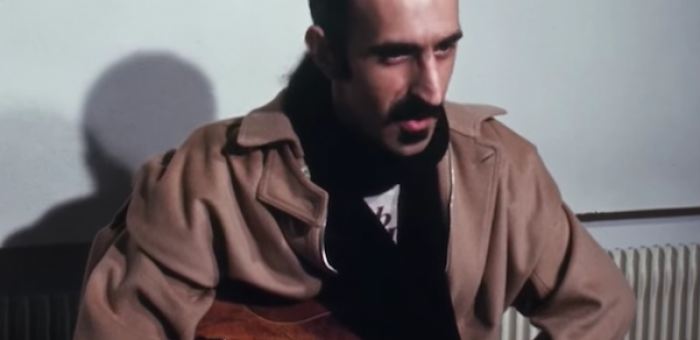Jan 13, 2026 2:09 PM
More Trump-Kennedy Center Cancellations
The fallout from the renaming of the John F. Kennedy Center for the Performing Arts to include President Donald…

A still from the trailer for Eat That Question: Frank Zappa In His Own Words, a new documentary about the pioneering guitarist-composer-bandleader.
(Photo: Courtesy Les Films du Poisson)Guitarist, composer, bandleader, filmmaker, satirist, outspoken social commentator, political gadfly, irascible perfectionist and renegade genius—the late Frank Zappa was all of these things and more, as depicted in Thorsten Schütte’s new 90-minute documentary Eat That Question: Frank Zappa In His Own Words, which premiered at the 2016 Sundance Film Festival. The Sony Pictures Classics release will open at The Film Forum in New York and at NuArt in Los Angeles on June 24.
By weaving together rare archival footage of band rehearsals and concert performances throughout Europe and the United States, along with TV interviews and candid moments at home, German filmmaker Schütte effectively conveys the essence of Zappa’s acerbic wit, incisive intellect, massive ego and eccentric charisma, along with his legendary commitment to his work. And he does it all without the use of a narrator. Hence the subtitle: In His Own Words.
A Libertarian at heart, Zappa’s staunch anti-authoritarian streak comes across loud and clear throughout the film in his exegeses on short-sighted record company executives, religious zealots and greedy politicians.
Zappa also casts a jaundiced view toward schools, censorship, the business of touring, the powerlessness of words, hippie/drug culture and a myriad of other topics that clearly get under his skin. To one intimidated questioner he offers: “Being interviewed is two steps from the Inquisition.”
Zappa is in particularly incisive form on CNN’s Crossfire with a panel of politicos on the topic of governmental censorship, and he is seen in Senate hearings rebutting arguments made by Tipper Gore and others from the Parents Music Resource Center regarding record labeling.
Schütte has compiled rare footage of a BBC report on the cancellation of a Royal Albert Hall performance of the 200 Motels score in 1971—due to obscenity. “We are protecting the reputation of the Hall,” says a representative of the prestigious London venue.
Zappa vowed never to return to England until he got an apology from the Queen, but he did indeed return for a 1981 performance of his symphonic works at the Barbican Arts Centre with the London Symphony Orchestra, conducted by Kent Nagano. And there is footage of a young Zappa in suit and tie playing a bicycle like a musical instrument alongside Tonight Show host Steve Allen.
Other musical treats in this fantastic ride through the life of one of the great musical minds of the 20th century include behind-the-scenes footage from the surrealist film 200 Motels, rehearsal and concert footage for the albums We’re Only In It For The Money, Roxy & Elsewhere and Tinseltown Rebellion, along with a guided tour of his home studio, including a demonstration of his Synclavier music workstation, which he used to record the Grammy-winning album Jazz From Hell. Zappa scoffs at the notion of winning a Grammy for an album that “nobody heard.” And he offers this motto regarding his atitude for being creative: “Anything, anytime, anyplace, for no reason at all.”
In one revealing moment, Zappa says, “I do my music for people who love music,” adding that he regards all of his compositions, whether it’s the pop hit “Valley Girl” or the Varèse-inspired ballet Mo ’N Herb’s Vacation, as equal parts of the tapestry of his life.
But when asked by a TV interviewer how he wanted to be remembered, Zappa replied, “It’s not important. I don’t care.”
The enigmatic and unrepentant iconoclast died from prostate cancer on Dec. 4, 1993, at age 52. Schütte’s film follows maestro Zappa up to his last days, delivering sobering comments during a 1993 Today Show interview regarding his final chamber music piece, The Yellow Shark, and the nature of his illness.

Belá Fleck during an interview with Fredrika Whitfield on CNN.
Jan 13, 2026 2:09 PM
The fallout from the renaming of the John F. Kennedy Center for the Performing Arts to include President Donald…

Peplowski first came to prominence in legacy swing bands, including the final iteration of the Benny Goodman Orchestra, before beginning a solo career in the late 1980s.
Feb 3, 2026 12:10 AM
Ken Peplowski, a clarinetist and tenor saxophonist who straddled the worlds of traditional and modern jazz, died Feb. 2…

The success of Oregon’s first album, 1971’s Music Of Another Present Era, allowed Towner to establish a solo career.
Jan 19, 2026 5:02 PM
Ralph Towner, a guitarist and composer who blended multiple genres, including jazz — and throughout them all remained…

Rico’s Anti-Microbial Instrument Swab
Jan 19, 2026 2:48 PM
With this year’s NAMM Show right around the corner, we can look forward to plenty of new and innovative instruments…

Richie Beirach was particularly renowned for his approach to chromatic harmony, which he used to improvise reharmonizations of originals and standards.
Jan 27, 2026 11:19 AM
Richie Beirach, a pianist and composer who channeled a knowledge of modern classical music into his jazz practice,…